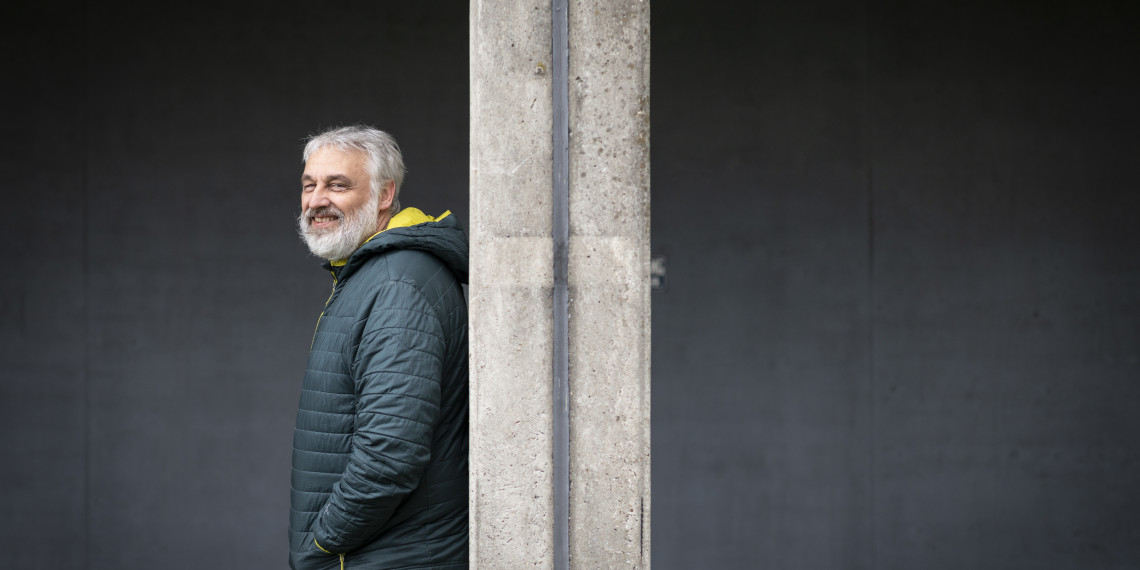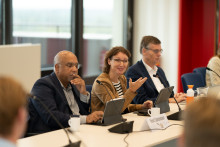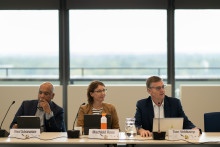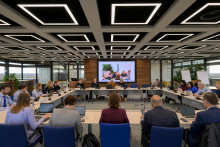The budget for 2025 did not come about without a struggle recently, it even required a suspension of more than a month. How do you look back on that?
'It's not that we said to the Executive Board: go back to the drawing board. We did want reassurances. Look, we are in a time when there is less money available for universities, that's a fact. For us, the question was not so much what the UT will spend the money on in 2025, but whether this is realistic and: how do you get the organisation back on track? And above all: how do you ensure that the organisation makes the switch to change? We had doubts about that.'
The term prisoner's dilemma was also mentioned, as in the budget discussion the year before. Did you as a university council have your back against the wall?
'We hired an advisor, someone with the necessary participation and budget experience at another university. He explained the different paths we could take, even if we did not agree to such a budget. Having our backs against the wall may be a bit strongly put, but as UT we are all in the same boat. One way or another, it is not a frivolous decision that you make as a council member who represents this community. Suppose we did not agree and later received a slap on the wrist from a national disputes committee, what would you have achieved? That's why we formulated our decision the way we did.'
'An Executive Board cannot constantly hold consultation hours on campus, but decisions must be explainable'
The Executive Board came up with all kinds of commitments. Do they reassure enough?
'The budget and the commitments are now a step in the right direction. In the coming months, a number of improvements should be visible in the financial reports, the decisions taken in response to these reports and the Spring Memorandum in which the contours for 2026 will be outlined in June. In that sense, we have created a kind of postponed story. Last year, we saw in the first management report that things did not look good. That should not happen again. At least as important is: what are we going to do about it? That means the Executive Board has to lead, but also the UT community that has to get to work. A year goes by quickly and you don't have much time to make adjustments if it turns out that you are not on track for the first four months. So you want to see that if there are conclusions, actions are taken.'
'Our main plea to the Executive Board: be clear about your motives. Why do you make a certain decision and what is the reasoning behind it? That's very easy to say from the sidelines, but that's where it starts. If you want to get the community on board, they need to know the rationale behind decisions. An Executive Board cannot constantly hold consultation hours on campus, but decisions must be explainable. If one unit is going to write a substantial deficit but another is not, it must be explained why such an exception is possible. It is not surprising that otherwise you get crooked faces. Ultimately, you want to see that there is a certain degree of control.'
Grip has been the keyword in recent months for a reason, especially after the Improfin report. Do you feel that this grip is now there?
'That is a question of conscience. As you know, this is not my first year in the University Council. I have now seen seven presidents of the board, seven rectors and I believe five vice-presidents. If I look at it all, we could do a lot worse in the current situation. What strengthened me recently was that we wanted to see the management letter. This is drawn up every year by the external auditor and contains all kinds of recommendations to improve the UT's business operations. We could see from the last two management letters that there are mechanisms in place to make the improvement. We were able to see progress on important topics and it is part of the quality management, the PDCA cycle.'
'It doesn't say everything, but it does say something about the extent to which a board has a grip on the situation; to what extent they also address what is signalled. Of course, you can always say that things have to be better, but it’s not easy given the national developments. The Internationalisation in Balance Act is perhaps the most threatening factor for this university. That is absolutely not easy for the current board. At the same time, it's why they are employed by this university, setting course and adapting to developments.'

That legislation must be clear this year, what is your fear?
'The contours are indeed becoming clearer, but it is still not clear whether we are going left, right or straight ahead. But the budget and the figures are already affected by it; the discussion has a deterrent effect on international students. In terms of income, the UT is relatively dependent on the student intake. The rule of thumb is that the influx of ten students is equivalent to the work of one employee. So just calculate what the effect is if we have 20 percent fewer students, or even fewer. That is an external threat, but in the meantime there are also internal challenges. We are really hurting ourselves across the board.'
'I understand very well that there is frustration around the systems that have to be worked with'
What exactly are you referring to?
'Of course, that infamous Improfin report did not mince words. Now it was not immediately earth-shattering in terms of conclusions, certainly not for insiders. But much that comes back in that report – that financial hygiene – is really something that needs to be in order. You can say: what does it matter if I register my holiday hours correctly? But you have to have your affairs arranged in time. Somewhat cynically, you can say that these are accounting tricks, but these are the rules of the game on which you are judged as a university and that can get you into serious trouble.'
'It is even more problematic in the administration of project hours. You cannot come up with a claim that you still want to submit five years later. I understand very well that there is frustration around the systems that have to be worked with. If I may say it with an understatement: there was something to criticize about the introduction of AFAS and UNIT4. That will undoubtedly play a role in people's resistance. But it is what we are paid for. In that sense: as an employee, you have to do what you have to do and not throw a spanner in the works out of frustration. That doesn't help us much, except to become much more frustrated. We must be able to monitor – and make timely adjustments on the basis of current data. That is therefore a joint responsibility.'
The financial headaches have been going on for quite some time now. If you zoom out, what is the picture you get of the past two and a half years?
'If I have to name a start, it would be the sudden plummeting of the influx in 2022. It was six hundred fewer first-year students than the year before. That will cost you directly around 6 million euros per year in income. The following year that did not recover and then you are at 18 million euros less. And in the meantime, the plan was to budget countercyclically and ambitiously, but we got a government that had other plans. That followed by an inflation correction and a sharp wage increase, that all cuts into it. Fluctuations in student numbers can be absorbed over several years, but with the billions of euros in cuts that the government is heading for, a cost-cutting task at the UT quickly rises to tens of millions. You can't just absorb that, then you're in serious trouble. Actually, we have been in a situation for two and a half years where we say: we have to get to work.'
But have 'we' really started working on those problems? Is there anyone to blame?
'Let me put it this way: if there is success, there are many winners – and in situations like this, there are many people who could have done it differently. I also take a critical look at our role as the University Council in this. We did ask for various – also disappointing – scenarios at an early stage, but couldn't we have sounded the alarm more strongly with the Executive Board, or should we have formulated our decisions and advice a little more strongly? In that sense, we also have to reflect. Ultimately, it comes down to the fact that a board, whatever choices are made, must be transparent about those choices. We still spend 350 million in government money here every year. How that money is spent must be understandable, traceable and in the interest of the university.'
You just dropped it, the desire for more clarity from administrators about the motives behind the decisions. Where exactly does that shoe pinch?
'Take, for example, the so-called building blocks (the UT's financial measure package, ed.). We told the Executive Board: be clear about what you are doing and where you want to go with it. We teach our students to formulate SMART objectives or to apply the RISE method. But in the meantime, that is lacking in these kinds of projects. There is no concretization. No doubt those directly involved will have an idea of what they want with the building blocks, but the point is that not only the inner circle has an idea of what needs to be done, it also concerns all circles around it. Everyone needs a clear definition of the problem, so that everyone knows how they can contribute to a solution – and not stand in the way of it. I find it difficult to say with the drama in which my own Faculty of Science & Technology finds itself, but we have to keep a positive atmosphere.'
Where should this university go this year, so as not to fall back into last year's pattern?
'Given the size of the austerity task, I think that not only S&T should reorganize. Government policy immediately makes it clear that ITC faces a major task in 2026. Whether there will be a UT-wide reorganization remains to be seen. Although I consider it inevitable. In any case, choices have to be made about how to deal with fewer resources, so the question must be asked how the staff will be deployed differently. That is not a choice of luxury. One way or another, the elaboration of Reinventing our UT will have to be much more concrete than Shaping2030, which is already outdated due to circumstances.'
'I am also looking with great interest at the effect of the Psychology programme, which will be bilingual from September. Suppose that 90 percent of Dutch students opt for the English-language track, then that is particularly significant for the entire discussion about the internationalization law. Because in that entire discussion, I have never heard: what does the student actually want? We'll see this year.'
‘But above all, I hope that we can move forward as a university. That we are attractive enough to continue and that students can find us. That at the end of this year we will no longer be complaining about financial hygiene and control over our administrative processes. That there is trust and perspective. We can jump high and low, but in the end, it’s all about trust.’








